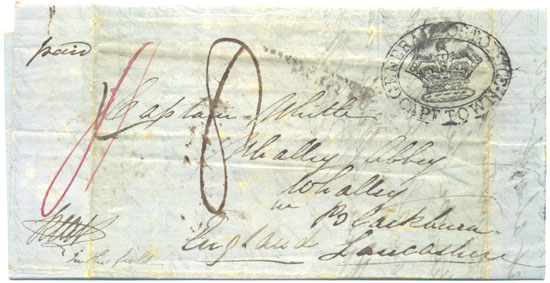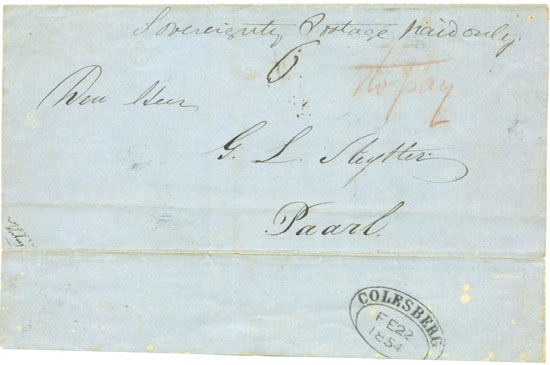ORANGE RIVER SOVEREIGNTY
In 1845 the Governor of the Cape sent Captain H.D. Warden, with a company of his regiment, to establish himself as British Resident, which he did on the site of the future capital Bloemfontein. On 23rd February 1848 Sir Harry Smith, the new Governor of the Cape, proclaimed British Sovereignty over the entire country, which was known as the Orange River Sovereignty.
Many of the Boer farmers were resistant to this and on 29th August 1848 Boers and British soldiers brought up from the Cape fought at the Battle of Boomplaats, 35 miles south of Bloemfontein. The British won the battle and proceeded to Bloemfontein which they re-occupied.
A letter from an Ensign to his father written on the day after the battle: The cover is annotated "In the field" and reads ".... I have had the good fortune to escape from one of the most dangerous predicaments I ever was in, in short I have been in battle where bullets came flying about me as thick as hailstones ....."

The postal system was at first most primitive with letters carried privately at varying rates according to the distances travelled. However in 1851 a uniform rate of 4d per half ounce was established for internal letters. Letters to the Cape were charged the Sovereignty rate plus the Cape internal rate (4d) if paid in advance, otherwise it was 6d. Letters to England were additionally charged the rate from the Cape to the U.K. This system of payment of a combination rate of postage continued, with some amendments, until 31st December 1880.

The Sovereignty ended on 23rd February 1854 and this cover from Winburg to Paarl in the Cape of Good Hope was posted just before. The manuscript "Sovereignty Postage paid only" evidences the 4d internal payment and the manuscript "6" with "to pay" in red indicates the amount to be paid by the addressee.
Home